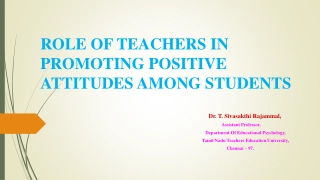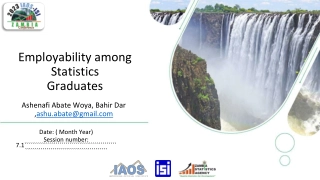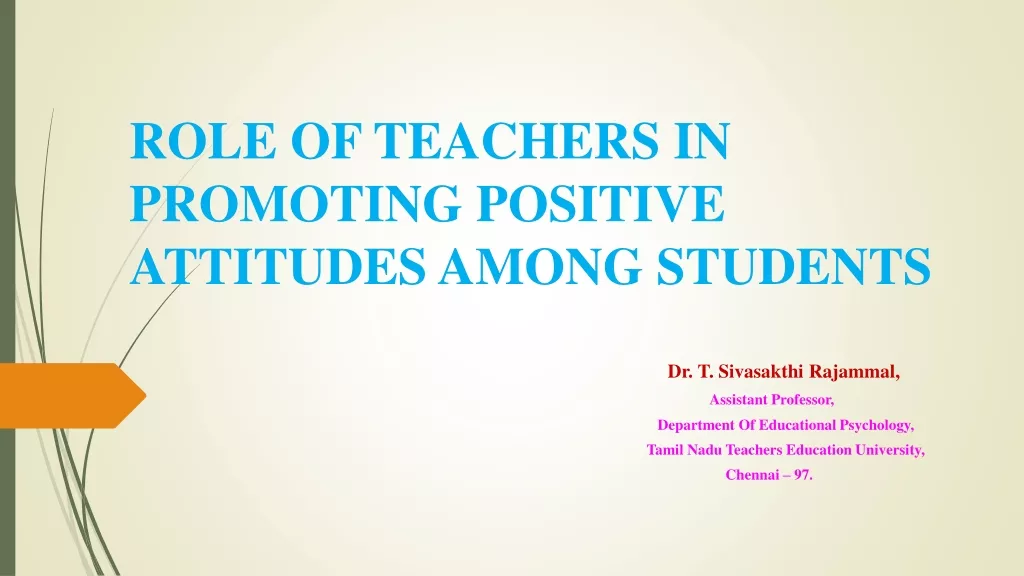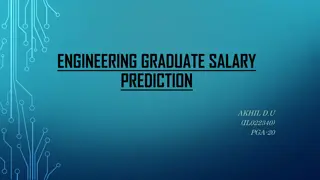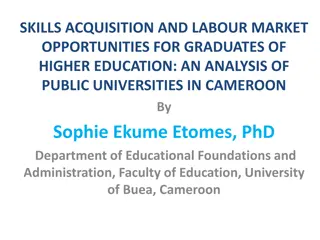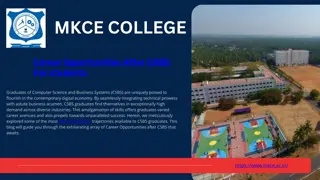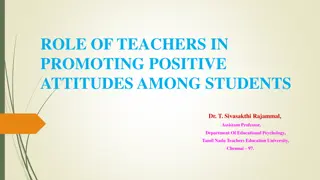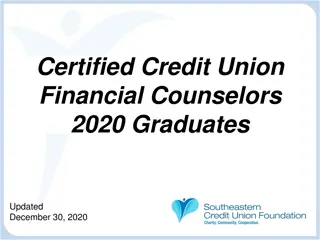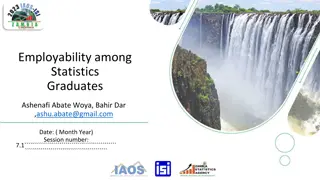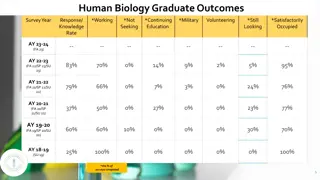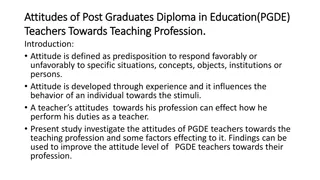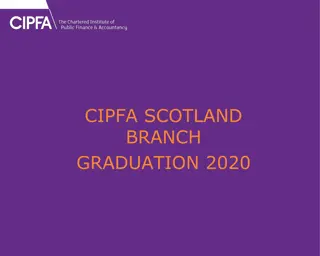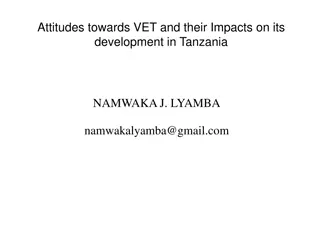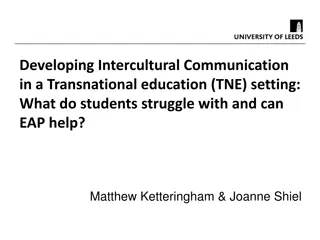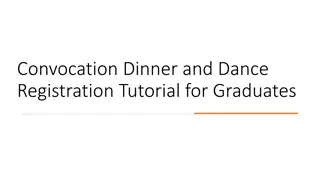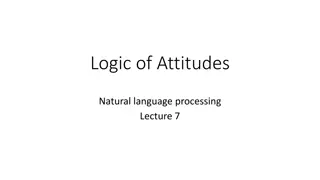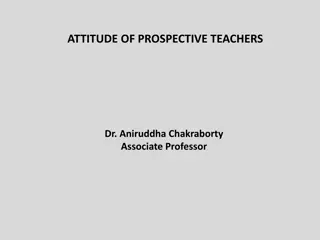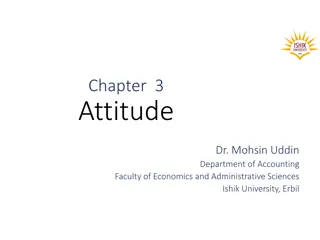Developing Positive Global Attitudes in TNE Environment Towards Global Graduates
This study delves into fostering positive global attitudes in a Transnational Education (TNE) setting as a crucial step towards cultivating global graduates. Key themes include knowledge of others, global issues, communication, collaboration, reflection, and attitudes like openness to diverse cultures and perspectives. The University of Central Lancashire's approach emphasizes cultivating culturally intelligent, resilient, reflective, and adaptable graduates who are future-ready and possess knowledge and analytical skills. Through open-mindedness, ethical decision-making, and effective communication and collaboration with diverse backgrounds, students can become globally competent and contribute positively to a changing world.
Download Presentation

Please find below an Image/Link to download the presentation.
The content on the website is provided AS IS for your information and personal use only. It may not be sold, licensed, or shared on other websites without obtaining consent from the author.If you encounter any issues during the download, it is possible that the publisher has removed the file from their server.
You are allowed to download the files provided on this website for personal or commercial use, subject to the condition that they are used lawfully. All files are the property of their respective owners.
The content on the website is provided AS IS for your information and personal use only. It may not be sold, licensed, or shared on other websites without obtaining consent from the author.
E N D
Presentation Transcript
Developing positive Global Attitudes in a TNE environment, a first step towards Global Graduates BALEAP PIM June 2022 Matt Thurston University of Leeds edmth@leeds.ac.uk
Global Graduates & Intercultural Communicative Competence
Global Graduates & ICC Neo-Liberal economic Liberal universal values Critical changing the status quo Global Citizenship Education (Andreotti et al. 2016, 91)
Common themes Knowledge Knowledge of others Knowledge of global issues Skills Communication & Collaboration Reflection Attitudes Openness to other cultures Openness to other perspectives Interest in global issues
Global Graduates in the UK
The University of Central Lancashire Graduate Attributes Culturally Intelligent with a Global Outlook Resilient & Reflective Adaptable & Future Ready Creative & Enterprising Knowledgeable & Analytical
The University of Central Lancashire Culturally Intelligent with a Global Outlook Students will be able to gather knowledge, understanding and/or experience of local, regional and global perspectives. They will have the ability to be curious and open to new and diverse perspectives and will be able to make informed and ethical decisions by being able to reflect on and be aware of their own and other s biases and emotions. Ability to communicate and collaborate with people from diverse backgrounds with integrity and confidence.
The University of Central Lancashire So, UCLan graduates should: Be curious and open to new perspectives Make informed and ethical decisions based on self- knowledge of biases Be able to communicate and collaborate with people from diverse backgrounds
Global Graduates and TNE How to develop global graduates in TNE? mono-cultural student body (often) less diverse teaching staff few overseas opportunities Foundation programmes have flexibility Attitudes are a good place to start
Global Attitudes Why Attitudes? Skills and knowledge are developed over a whole programme (lifelong learning?) Attitudes are core, without a positive view of the global community, global knowledge and global skills are less likely to develop Positive attitudes lead to greater motivation
Attitudes in ICC Deardorff, 2006 Byram, 1997
Attitudes in Language Learning Motivation Specific links of positive attitudes to the international community and motivation General links of attitude to language learning motivation Gardner, 1985 Yashima, 2002
Attitudes in Language Learning Motivation Positive views of Global Future Selves driving motivation to become this future self D rnyei s L2 Motivational Self System (Taguchi et al. 2009)
The Planned Intervention
Learning Context Two joint programmes at mid-high ranking public universities in China 4+0 structure, 1 year Foundation + 3 year BA/BSc Dual degrees 1) Sports Science 2) Arts and Media
The Planned Intervention Aim To enable students to develop positive global attitudes through the course of a Foundation year Attitudes targeted A positive view of other cultures and openness to different perspectives A positive view of the global community and their place within it
The Planned Intervention Intervention Structure Embedded in two existing Foundation modules Semester 1 Developing Academic Skills Project-based learning exploring intercultural topics whilst developing academic skills Semester 2 Professional Communication Skills (ESAP) Developing ESAP through exploring future global selves
The Planned Intervention Quasi-experimental Students will be divided into control and experimental groups Research Questions 1) Do students develop more positive views of other cultures and openness to other perspectives? Do students develop a more positive view of the global community and their role within it? Is there a correlation between global attitudes and academic motivation 2) 3)
Measuring Global Attitudes A work in progress! The focus will be on quantitative surveys, but with additional qualitative elements
Measuring Global Attitudes Self-report Questionnaires Students will complete self-report questionnaires at the start of Semester 1, end of Semester 1 and end of Semester 2. These questionnaires will be developed for the study, but will draw upon the literature of ICC, global competencies, and language learner motivation. They will cover both attitudes and academic motivation.
Measuring Global Attitudes Global Future Selves exercises Students will complete an in-class exercise at the start of Semester 1 and end of Semester 2 to elicit views about their future global selves Semi-structured Interviews Interviews of selected students to further explore trends identified in the surveys and in-class exercises
Questions I have! Am I right to focus on attitudes? - Is this focus theoretically sound? Are there any better/alternative measures I could use? Will such an intervention achieve significant results? MThurston@uclan.ac.uk


